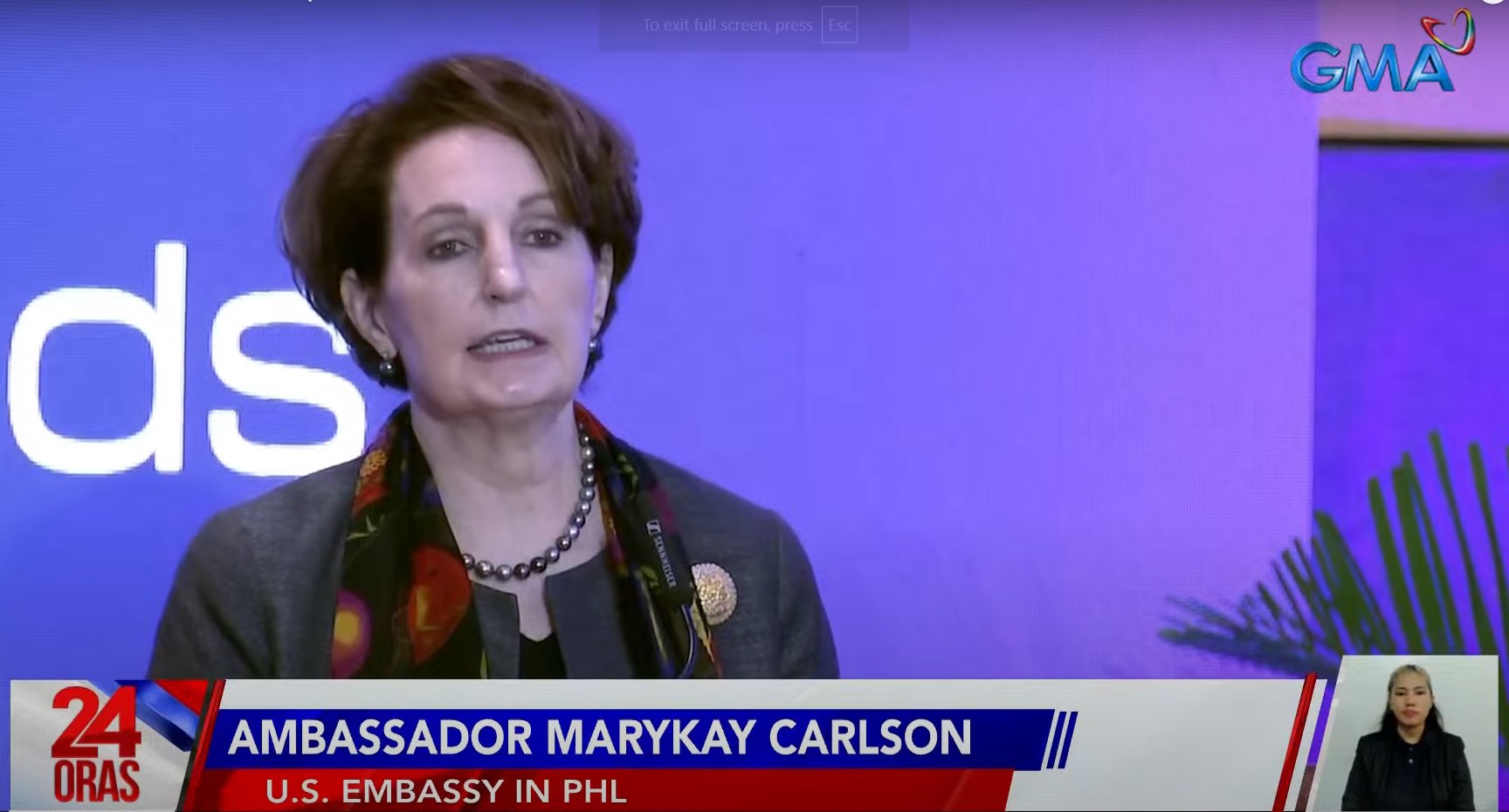US to China: Cease harassing PH ships

The United States on Wednesday called on China to stop harassing Filipino vessels amid the ongoing tension in the West Philippine Sea (WPS).
Speaking before journalists, Ambassador MaryKay Carlson reiterated US support to the Philippines in the country’s ongoing territorial dispute with China in the region.
“The chorus against threats to peace and stability in the South China Sea is growing louder and stronger each day,” Carlson said in her speech at the East-West Center’s International Media Conference in Manila.
“We urge the (People’s Republic of China) to cease harassment of Philippine vessels lawfully operating in the Philippine exclusive economic zones; to halt its disruption to states’ sovereign rights to explore, utilize, conserve, and manage natural resources in their territories and EEZs; and to end its interference with the freedoms of navigation and overflight of all states lawfully operating in the region,” the envoy said.
On June 17, a Philippine Navy sailor lost a thumb and several others were injured after China Coast Guard (CCG) vessels repeatedly rammed Philippine Navy rubber boats to stop them from delivering food supplies, firearms, and other necessities to BRP Sierra Madre at Ayungin Shoal.
The CCG personnel were also seen brandishing knives, an axe, and pointed sticks.
Based on videos and photos released by the Philippine military, the hulls of the PN boats were slashed and the navigational equipment were damaged by the Chinese.The Philippines has sent a note verbale to China over the incident. The Department of Foreign Affairs (DFA) is also considering summoning Chinese Ambassador Huang Xilian to explain his country’s actions.
Defense Secretary Gilberto Teodoro Jr. described the incident as "an aggressive and illegal use of force by the Chinese forces.
Recently, China Coast Guard 5901, the world's largest coast guard ship known as "The Monster," was also spotted near BRP Sierra Madre in Ayungin Shoal.
The Sierra Madre is a World War II era tank landing ship that was deliberately grounded by the Philippine Navy at the Ayungin Shoal in 1999 to strengthen the country's territorial claim. It is manned by a detachment of Philippine Marines.
Partnerships
Meanwhile, Carlson listed some of the projects the US and the Philippines are currently undertaking. This includes the Philippines-U.S. Cyber-Digital Policy Dialogue which is set to be conducted in July.
The dialogue is targeted to reaffirm their shared commitment to “open, interoperable, reliable, and secure digital connectivity and information and communication technologies to support growth of the digital economy and deepen bilateral cooperation on cybersecurity”.
The ambassador also said both allies are expanding maritime activities, citing the Us-Philippines’ joint maritime patrol in April.
“The Indo-Pacific is the most dynamic and fastest-growing region on Earth, and an essential driver of U.S. and global security and prosperity,” Carlson said.
“Thanks to an unprecedented level of cooperation with friends, partners, and allies, we have made great strides in advancing our shared vision for this region. As journalists, you’re out on the front lines – covering conflicts and crises, elections, important global meetings that chart the future of our planet, and every other manner of major events,” the envoy addressed the media.
Debunking false narratives
DFA Secretary Enrique Manalo underscored the importance of journalists in the territorial dispute in the West Philippine Sea (WPS), saying the government is working with the media to “ensure that the public is in possession of the facts”.“The ability of the press to report on global events, and the ability of people to appreciate and understand these events, is under sustained attack from disinformation and cyberattacks. Many countries, including the Philippines, have been targeted by malign actors wantonly exploiting technology to distort and manipulate facts,” Manalo said.
“Genuine photos and videos – or those that are not AI-generated or digitally manipulated – speak louder and more powerfully than the myriad attempts at misinformation and the peddling of false narratives,” he added.
The envoy also refuted the “false narratives” in the dispute including one that claims the WPS serves as “merely a stage for Great Power rivalry in the region, that the Philippines is just a pawn in this game, and that we act only at the behest of another country”.
“This reductionist view muddles our understanding of the complex situation on the ground and detracts from the real crux of the issue: that a country is choosing to ignore international law, in particular the United Nations Convention on the Law of the Sea as affirmed by the 2016 Arbitral Award, and the legitimate rights and interests of coastal states, such as the Philippines,” the secretary said.
“Only faithful implementation of the rules in the maritime space can effectively reduce conflicts over maritime boundaries and resource claims, thereby promoting peace and stability at sea,” he added.
2016 arbitral ruling
Beijing claims almost the entire South China Sea, a conduit for more than $3 trillion in annual ship commerce. Its territorial claims overlap with those of the Philippines, Vietnam, Malaysia, and Brunei.
Manila refers to parts of the South China Sea within its exclusive economic zone as the West Philippine Sea.
In 2016, an international arbitration tribunal in the Hague ruled that China's claims over the South China Sea had no legal basis, a decision Beijing does not recognize. —RF, GMA Integrated News




